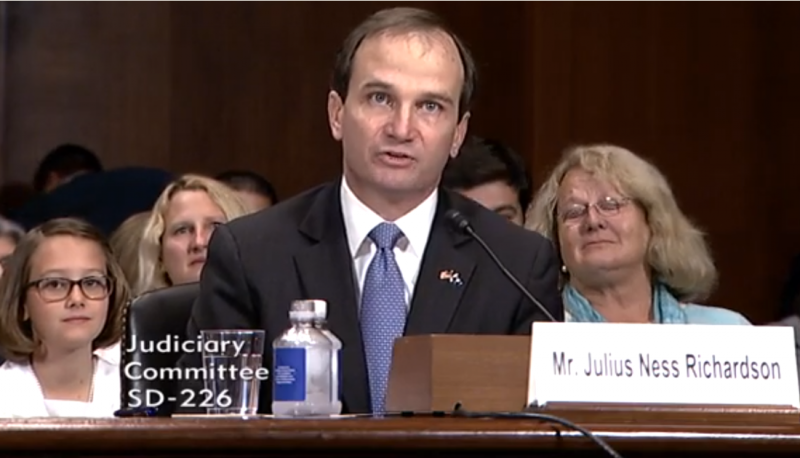“Confirmed Judges, Confirmed Fears” is a blog series documenting the harmful impact of President Trump’s judges on Americans’ rights and liberties. Cases in the series can be found by issue and by judge at this link.
Trump Fourth Circuit Judges Julius Richardson and Marvin Quattlebaum cast key votes to reverse a district court decision and rule that the government did not violate the rights of 23 Muslim citizens by including them on a travel watchlist that interferes with their right to travel without giving them an opportunity to prove that they should not be so included. The March 2021 decision was in Elhady v Kable.
Anas Elhady and 22 other Muslim US citizens filed suit because they had no opportunity to challenge their inclusion on a federal government watchlist, known as the Terrorist Screening Database (TSDB), which caused them significant harm. For example, as the district court found, there is “no evidence, or contention” that Anas Elhady is a “known terrorist” or has been “charged or indicted for any criminal offense related to terrorism.” Although the government declined to confirm his status, his apparent inclusion on the TSDB has caused a series of significant “adverse consequences” when he has attempted to travel.
Specifically, on one occasion, when attempting to return to the US by car from Canada, Elhady was “surrounded” by border officials, “handcuffed, and then escorted to a room where he was held for more than ten hours and repeatedly interrogated.” During that period, Elhady “required emergency medical attention” and was taken “in handcuffs” to a hospital. On several prior occasions, Elhady was detained “for seven to eight hours” when crossing into the US, and was “handcuffed, stripped of his belongings, kept in a cell, and prohibited from contacting his attorney.” Officials confiscated his phone “multiple times” at the border, “pressured” him to reveal its password and ”questioned” him about its contents, and told him on one occasion that a person “like you should have stopped crossing the border by now.” Although he was never charged with any offense, Elhady “stopped crossing the border altogether and stopped flying for more than a year.” He complained to the Department of Homeland Security (DHS) to no avail.
After extensive discovery and hearings, US District Judge Anthony Trenga, who was nominated by President George W Bush, granted partial summary judgment for the 23 plaintiffs, ruling that the TSDB as handled by the government deprives them of procedural due process under the Constitution, Judge Trenga explained that the government is impairing the 23 Muslim citizens’ liberty interest in travel and reputation without providing them a “meaningful opportunity” to challenge their inclusion on the list. Although recognizing the government’s “profound, compelling, and fundamental interest” in combating and preventing terrorism, Trenga noted that unlike the procedures that actually allow someone to challenge their placement on the “No Fly” list, the procedure concerning the TSDB is a “black box,” where individuals are “not told,” even after filing with DHS, whether they are on the list or anything about the “factual basis” for inclusion. The court thus concluded that there was a “high” risk of “erroneous deprivation” of the individuals’ “travel-related and reputational liberty interests,” and that existing procedures are “not sufficient to address that risk.” Although Judge Trenga had not yet determined the appropriate remedy, he allowed the government to appeal to the Fourth Circuit.
Trump judges Quattlebaum and Richardson joined an opinion by conservative Judge J. Harvie Wilkinson that reversed the district court and ordered dismissal of the case. The panel concluded that it “need not address” the adequacy of the procedures used concerning the TSDB because they held that the 23 individuals “have not demonstrated infringements of constitutional liberty interests.” Taking a decidedly different view of the facts than the district court, the panel claimed that the plaintiffs mostly experienced “minor delays” at airports and other places that are “not dissimilar from what many travelers routinely face,” and that the alleged “deterrence” from traveling caused by such “inconveniences” was not sufficient. The panel also ruled that the individuals’ alleged harm to their reputations was insufficient because the “government does not disclose TSDB status” publicly and they had not shown that the government had harmed them, other than that they “might make people think badly of you.” The government has an “extraordinarily significant” interest, the panel concluded, and the courts should not interfere.
In addition to the general principle that appellate courts should respect district courts’ factual determinations, the panel ignored many of Judge Trenga’s conclusions. He noted many examples of “severe” consequences to the plaintiffs like those described above, found that inclusion on the watchlist was “closely analogous to the No Fly List” as to which there is clearly a protected liberty interest, and cited previous cases supporting his conclusion that government actions that “actually deter” travel as in this case create an “unreasonable burden” on the right to travel. Trenga also noted “substantial” reputational interests because of the significant dissemination of information on whether a person is on the TSDB to “over 18,000 state, local, county, city, university and college” agencies and “approximately 533 private entities” for purposes “far removed” from border security. The likely negative reaction of these entities to those on the watchlist, Judge Trenga concluded, serves to “underscore the need overall for strong procedural protections.”
Advocates for the 23 Muslim citizens have expressed great concern that the panel “ignored the dire consequences experienced by American citizens placed on the watchlist” and are seeking reconsideration of the ruling by the full Fourth Circuit. In the meantime, the votes of Trump judges Quattlebaum and Richardson have resulted in complete dismissal of these individuals’ case.

